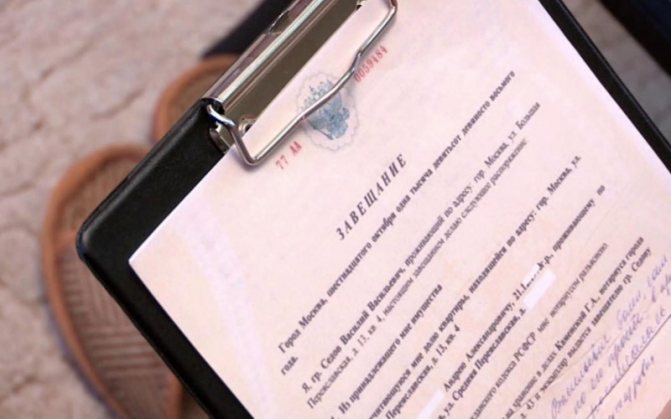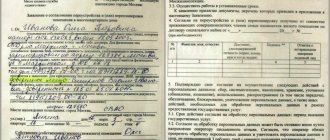Home / Family law / Inheritance
Back
Published: 08/10/2018
Reading time: 4 min
0
188
Everyone knows about the possibility of obtaining property to a greater or lesser extent. But when it comes to implementing the right to inheritance in practice, there are many issues that need to be resolved.
As is known, the right of inheritance arises upon the death of one of the relatives or a person who could inherit property. Therefore, the first step in inheritance is to obtain information about the death of the testator. Maintaining family ties with your family members ensures that you receive up-to-date information about significant facts, so if one of your relatives dies, you will be notified.
- How to find out if there is a will
- About inheritance without a will
- Inheritance in another city
- Procedure for entering into inheritance
But situations often occur when relatives do not maintain relationships with each other and you can find out about the death of a loved one using alternative sources: information from neighbors, friends, acquaintances.
How to find out if there is an inheritance
It is not the responsibility of the notary or relatives to notify the heirs about the property. In this case, you can only find out about it by chance. The easiest way is to ask a relative during his lifetime. Those who were present when the document was drawn up do not have the right to disclose its contents or even its existence. Only the testator can do this.
The organization has the right to post death data in its information database or on other resources. Some materials are not publicly available. The notary is engaged in publication and notification on his own initiative. Common problems when transferring property:
- not knowing about the existence of a will;
- not receiving information about death;
- not knowing about your share.
Only the heir himself is responsible for ignorance. Relatives or the notary do not bear administrative responsibility for finding the legal owner of the property. There are several ways to find out about a will.
How to find out about inheritance if there is no will?
If the owner did not leave a will during his lifetime, the inheritance procedure will be carried out in accordance with the law - in order of priority. Thus, civil legislation defines eight lines of successors. Relatives of each subsequent group are called upon to inherit, unless there are no applicants included in a higher queue (died or abandoned property).
Thus, the primary assignees are:

- children;
- parents;
- surviving spouse.
Second in line are brother-sister, grandfather-grandmother, and so on.
Read more about the queues of heirs in the article “Inheritance by law”.
It happens that blood relatives living distantly do not communicate with each other and do not maintain relationships. And they don’t know what changes have taken place in the family - who got married, divorced or was born.
Let's give an example: the sister found out about the death of her brother, but did not contact the notary - she assumed that the brother's wife and daughter would take over the inheritance rights. However, it turned out that he and his wife had been divorced for a long time, and his daughter abandoned the property because she had gone abroad. This means that the sister will be the legal successor.
But in some cases, relatives deliberately hide information about the death of the testator, that there is property or that there are no legal successors. In this way, they get rid of unwanted applicants, in the hope of getting a large “piece” of the inheritance.
For example, the son did not know about his mother’s death, since he moved to another region and rarely communicated with the family. His uncle - his mother's brother - did not inform his nephew about what had happened, hoping after a six-month period to inherit the property himself and become the sole owner of the property. However, he did not take into account the son’s legal right to restore the term, since he did not know about the death of his mother.
By last name
How to find out if there is an inheritance online by last name? In addition to the paper version of the document, information about all heirs is contained in the Unified Information System. If the person is mentioned in the will, the notary must respond to the request and provide information. To search for a will using the full name of the heir, you need to go to the FNP website or to the notary office where the person was previously registered at his place of residence. To search for a hereditary document through the website you need:
- Follow the link https://notariat.ru/ru-ru/help/probate-cases/.
- Enter your full name, date of birth and death.
- To start searching.
If the heir is sure of the person’s death, but cannot find the will online, he needs to contact a notary at the place of residence of the testator. To receive information from employees, you must provide:
- passport;
- death certificate of a person;
- documents on the degree of relationship.
The last point is not mandatory, but it will significantly speed up the process, since the queue for inheritance is often formed according to the degree of relationship. The local notary office may not have a will, then you need to send a request to the regional authority, where all such documents are reviewed. If it was not there, there is a high probability that the deceased did not draw up the document.

The procedure for searching for inheritance cases
In order to see whether an inheritance case has been opened in relation to a deceased person, you should refer to the website of the Federal Notary Chamber.
In the useful information tab there is a section “search for inheritance cases”, after clicking on the tab you will need to enter the full name of the testator, his date of birth and date of death. If an inheritance case has been opened, the system will provide information about the number of the inheritance case and the notary.
If an inheritance case has not been opened, information about this will therefore not be available on the site.
IMPORTANT : in general, all information about initiated inheritance cases is reflected on the above site. You can contact the notary at the place of residence and death of the testator with a request about whether an inheritance case has been opened or not.
Abroad
How to find out what inheritance is left after the death of a relative abroad? To obtain information about a will, it is necessary to take into account foreign legislation. The transfer of property will go faster if relatives in another country facilitate this. Otherwise, the heir is recommended to use the services of a law firm. A common practice is for several persons living in other countries to inherit the property of a deceased person. The notary considers each such case individually, since the deadlines for filing an application for acceptance of inheritance are different on two or more sides.
It will not be possible to contact the authorities at the place of registration of the deceased directly, so you need to use paid search services for each country.
To help the heir: how much to pay for the inheritance
- disabled people of groups I and II,
- disabled people of the Great Patriotic War and persons equivalent to them
- citizens classified as the first category of victims of the Chernobyl disaster,
- persons disabled by age, orphans and the state.
- citizens who inherit the property of persons who died in defense of Ukraine, in connection with the performance of other state or public duties or with the fulfillment of a citizen’s duty regarding saving people’s lives, protecting public order and fighting crime, protecting private property or collective or state property.
Prostopravo.com.ua reviewed the payments that each heir pays to receive an inheritance at state notary offices. Private notaries determine the cost of their services by agreement with the heirs, but it cannot be less than that established by the state.
We recommend reading: From what year do they contribute to the pension fund?
How to find out who has entered into an inheritance
How to find out about inheritance if there is no will? To understand whether a person has entered into an inheritance, you need to check the queues for legal inheritance. There are five main queues:
- Wife/husband, children, mother/father.
- Brother/sister, grandmother/grandfather.
- Uncles/aunts.
- Those who lived with the deceased in the same family for more than five years.
- Non-blood relatives (stepfather, stepmother, etc.)
Living with the testator must be confirmed by a document confirming registration at the address. If it is not there, you can get confirmation through the court. Such a document will be taken into account when distributing the state. If the deceased did not take care of the will, the relatives must contact the notary themselves.

Difficulties in data collection
The starting point for opening an inheritance case and considering candidates for heirs is the actual date of death of the citizen who left material wealth. Recipients are given six months to complete the registration, during which they need to learn about the inheritance and take ownership.
If the applicant does not communicate regularly with the testator, the following difficulties await the applicant:
- Ignorance regarding the fact of death. If the heir did not know about the death of the testator, then he does not have the right to receive information about the total inheritance mass. A mandatory attribute is the presentation of a death certificate, but if none of the applicants presented the document and the deceased did not draw up a will, then the property becomes the property of the state.
- Lack of information about the existence of a will. How to find out about the inheritance if the applicant who does not have factual knowledge about the will of the deceased has not communicated for a long period, and whether it existed at all? The notary is engaged in the search for heirs, sending a corresponding notification to the addressees at the place of actual residence indicated in the document.
How to find out about an inheritance from a notary depends on whether the applicant is included in the co-heirs. If a citizen is included in the total number of recipients, then the notary is obliged to provide information about the inheritance mass and the list of other applicants for the material assets remaining after death.
How to find the heirs of a deceased person
The notary will post an advertisement for the search for heirs in the media and on his website. If there is a party who is interested in transferring property to relatives, it is necessary:
- Use social networks to search.
- Check the electronic register of citizens of the country.
- Establish connections through distant relatives.
- Collect information from the places where they lived.
- Put on the wanted list.
- Contact a special organization to search for people.
If the receiver shows up too late, the relatives can enter into an agreement and transfer part of the inheritance to him at their own request.
Deadlines for accepting an inheritance
You can submit an application for acceptance of inheritance within 6 months. A potential heir should take into account that:
- the accounting begins the day after the death of the testator;
- the deadline includes all weekends;
- If the last day of the period falls on a holiday, it is extended until the next working day.
After six months, the relative will not be able to apply. This is regarded by the notary as unwillingness to accept the property. But there is a procedure for restoring the deadline.

Restoring the deadline for accepting an inheritance
You can regain your right to accept an inheritance only through the court. The potential heir prepares a statement of claim, indicating one of the reasons:
- did not know about his property;
- business trip;
- disease;
- was not informed about the death of a relative;
- didn't know about its existence.
The court may restore the term of an incapacitated or minor heir.
How to find out if there is a will
The legal framework of the Russian Federation regarding inheritance differs sharply from what Russians see in Hollywood films. A Russian notary does not voluntarily search for the heirs listed in the will and does not monitor the life of the testator, i.e. may not know about the death of the testator until one of the relatives applies for the opening of an inheritance. Therefore, the search for a will falls entirely on the shoulders of the applicants for the inheritance .
To start your search, you need to know where you can and should look for the required document.
Problems when receiving an inheritance
After receiving the property, the heir may face a number of problems. Before writing an application for acceptance, you need to consider:
- Along with the property, debts are also transferred. The bank may notify the new owner on time or only after the statute of limitations has expired. The amount of debt should not exceed the value of the property received, but the heir pays state duties and other expenses.
- Problems with searching for property. This may be real estate in other countries or cities. All costs of finding it fall on the heir. If there is no will, then finding a property can be difficult.
- Bank deposits of the deceased. The heir must submit requests to banks to search for the deceased's accounts before the deadline for filing an application for acceptance of the property expires. This is difficult to do when the heir is a distant relative who is not aware of all the financial transactions of the deceased.
You should ask the relatives of the deceased or a lawyer in advance about all the pitfalls of inheritance.
Finding a Will Made in Emergency Circumstances
How can I find out about an inheritance or will made in emergency circumstances? The form of such documents has been simplified. The inheritance case was drawn up in conditions of danger to the life of the property owner and the absence of the possibility of proper registration with a notary. The will loses legal force if the participants do not apply to a notary a month after it is written. The signing of a document, in such conditions, can be certified by unauthorized persons (two or more).
The court takes into account a will drawn up under emergency circumstances as a full-fledged document on the transfer of property. The search procedure is entirely up to the heir. It is much easier to restore the deadline for filing an application under such circumstances.
How to find out about a will
Unfruitful searches for a will at the place of residence should be continued. How can I find out about the presence of a will in other ways?
1. Contact a notary at the place of residence of the deceased.
Attention: you can find out the notary office or private notary assigned to the area of residence of the deceased at https://data.notariat.ru/directory/notary/ .
When you visit a notary for the first time (initial collection of information), you must have with you:
- death certificate of the testator;
- personal passport.
If there is no mark on kinship or marriage, additional papers will be required confirming the kinship (birth certificate, adoption certificate, etc., which will be requested by the notary).
A negative answer does not mean that there is no will. It may be located in another notary office. After all, at the place of first application they cannot always (there is no access to the database via the Internet, online) and are not obliged (to make a request to the notary chamber) to check for the presence or absence of a will.
2. Make a request to the notary chamber, which has access to the database of all notaries. Here you also need documents confirming the death of the testator, the identity of the applicant, and family ties. The response of this organization is final.










